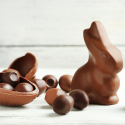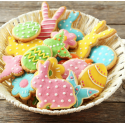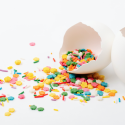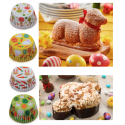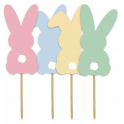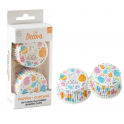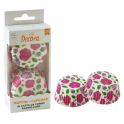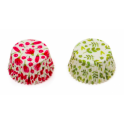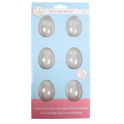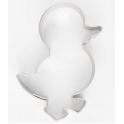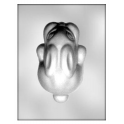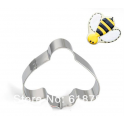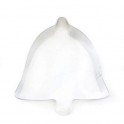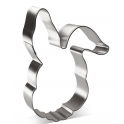EASTER
- EDIBLE PRINT
- BAKING TOOLS
- Big quantities
- BIRTHDAY
- CAKE DESIGN TOOLS
- CAKE POPS AND HARD CANDY
- COLORS & PENS
- COOKIE CUTTERS
- COOKING TOOLS
- CUPCAKES
- FONDANT & +
- FRENCH PATISSERIE
- INGREDIENTS & MIXES
- MOLDS, PANS,...
- MOVE & PRESENT
- OTHER SWEETS
- PARTIES & EVENTS
- SEARCH BY BRAND
- SEASONAL
- SPRINKLES, SUGAR PEARLS ...
- Summer hits
- WORKING WITH CHOCOLATE
- WORKING WITH SUGAR
-

House of cake - Topper Silver Balloon Cloud
8.00 CHF 15.50 CHF
Easter is an important Christian holiday in Switzerland, and several traditions are commonly observed in the country. Whether with family or friends, the Easter weekend is also a time to relax and enjoy the return of spring and the warm weather.
Sometimes you can use this time to decorate Easter eggs. Decorating eggs is a tradition in many othe...
Easter is an important Christian holiday in Switzerland, and several traditions are commonly observed in the country. Whether with family or friends, the Easter weekend is also a time to relax and enjoy the return of spring and the warm weather.
Sometimes you can use this time to decorate Easter eggs. Decorating eggs is a tradition in many other countries, but in Switzerland it is a common tradition. There are many ways to decorate Easter eggs, including painting, dyeing or wrapping them in coloured yarn. And the alternative is of course to make your own decorated chocolate eggs at home. This is an activity that can be done alone or in groups. All you need is a chocolate egg mould and good quality tempering chocolate.
Apart from decorating eggs, there are also eggs to find, to throw, to roll... The egg race is a popular Easter tradition. Children decorate hard-boiled eggs and roll them up a hill to see which one will go the furthest. This is just one variation of the many games you will find depending on the region. Each region may have its own customs and practices, but the spirit of the festival is generally one of renewal, joy and celebration of new life.
Going back to what is eaten, Easter brunch is a popular way to celebrate the holiday in Switzerland. Families gather over a meal that often includes traditional Easter dishes such as lamb or ham, and chocolate Easter eggs and bunnies for dessert. Easter is traditionally associated with sweets and delicious desserts. Here are some ideas for celebrating Easter with sweets:
Chocolate shapes: chocolate bunny, chocolate egg, chocolate chick... various shapes that have their origin in various symbolism related to Easter and the return of spring. You will find all these shapes and chocolate moulds with us, as well as quality baking chocolate that will allow you to produce what you want.
Easter can also be the occasion to decorate biscuits with Easter shapes (eggs, chicks, bunnies, doves,...): Prepare biscuits in fancy shapes and decorate them with coloured royal icing or sugar paste. We have various brands of food colouring available in our range. Pastel colours are often chosen for Easter.
Will you try to make a homemade dove this year? Our range includes paper moulds specifically for baking doves. They are packaged in five pieces, so you can bake several at a time. A challenge?
If you're invited to a brunch, why not bring a carrot cake decorated with sugar carrots or other flower-shaped sugar decorations? This classic Easter dessert is a moist and spicy cake with grated carrots and cream cheese icing. Or make your favourite cupcake recipe with an occasional Easter theme. With buttercream or enchanted cream, mixtures of which are available in the shop, a pretty pastel colour and some sugar decorations in the shape of a rabbit, egg or flower.
These are just a few ideas for celebrating Easter with sweet treats. Be creative and have fun with your desserts!
The origins of some Easter symbols:
The rabbit is a common symbol associated with Easter as it represents new life and fertility. In many cultures, rabbits are known for their ability to reproduce quickly and in large numbers, making them a symbol of fertility and renewal.
Over time, as Christianity spread across Europe, many pagan traditions were incorporated into Christian celebrations. The Easter Bunny became associated with Easter as a symbol of the new life and rebirth that accompanied the resurrection of Jesus Christ.
Today, the Easter Bunny is often depicted as a rabbit in the shape of a friendly character who hands out eggs, candy and other goodies to children on Easter morning. The Easter Bunny tradition is particularly popular in Western cultures, including the United States, Canada and parts of Europe.
Chicks, like rabbits, are also a common symbol associated with Easter, as they represent new life and rebirth. Chicks emerging from eggs are a powerful symbol of new beginnings, growth and the renewal of life. In fact, the tradition of decorating eggs at Easter goes back many centuries and has its roots in the pagan tradition of celebrating the spring equinox and the return of life to the earth.
In many cultures, eggs are also a symbol of new life and rebirth. Decorating and exchanging eggs at Easter is a way of celebrating the arrival of spring and the renewal of life after the long, dark winter. This is why chicks are often depicted in Easter-themed decorations and designs, alongside other symbols of spring and rebirth, such as flowers and butterflies.
Eggs are still a common symbol associated with Easter as they represent new life and rebirth. The tradition of decorating eggs at Easter dates back many centuries and has its roots in the pagan tradition of celebrating the spring equinox and the return of life to the earth.
In many cultures, eggs are also a symbol of new life and renewal. For Christians, Easter is a celebration of the resurrection of Jesus Christ, and the egg is a powerful symbol of the tomb from which Jesus emerged.
Easter eggs can be decorated in a variety of ways, including painting, dyeing or wrapping them in coloured yarn.
In addition to decorating and exchanging eggs, many people like to eat eggs as part of the Easter celebrations. In fact, Easter is one of the busiest times of the year for the egg industry, with millions of eggs consumed in the form of Easter treats such as chocolate eggs and egg-shaped candies.
EASTER There are 98 products.
Subcategories
-
Chocolate Mold
Easter is coming!
Will you be making homemade chocolate shapes this year?
You can mould chocolate eggs for example. You will have to choose white, milk or dark chocolate. There are also many different sizes available. From the size of a praline to a 1 kilo chocolate egg that can be filled with a surprise. If this is the first year you are trying this, it is important to temper the chocolate well and perhaps start with a medium sized chocolate egg mould.
You can mould bunnies too. Realistic bunnies or man-shaped bunnies, big or small, there is also a wide choice of chocolate moulds. We have cheap chocolate moulds, but also professional polycarbonate chocolate moulds.
If you are moulding small eggs, you can spray the mould with chocolate dye to prepare it. For large eggs, you can poach a decoration on the side using piping bags, thin round piping and royal icing.
Generally speaking, rigid plastic moulds are polycarbonate chocolate moulds. This food-grade plastic gives a professional glossy finish.
In our assortment you will also find chocolate moulds for small fish, ducks, ...
The origins of some Easter symbols:
The rabbit is a common symbol associated with Easter as it represents new life and fertility. In many cultures, rabbits are known for their ability to reproduce quickly and in large numbers, making them a symbol of fertility and renewal.
Today, the Easter Bunny is often depicted as a rabbit in the form of a friendly figure who hands out eggs, candy and other goodies to children on Easter morning. The Easter Bunny tradition is particularly popular in Western cultures, including the United States, Canada and parts of Europe.Chicks, like rabbits, are also a common symbol associated with Easter, as they represent new life and rebirth. Chicks emerging from eggs are a powerful symbol of new beginnings, growth and the renewal of life.
This is why chicks are often depicted in Easter-themed decorations and designs, alongside other symbols of spring and rebirth, such as flowers and butterflies.Eggs are still a common symbol associated with Easter as they represent new life and rebirth. The tradition of decorating eggs at Easter goes back many centuries and has its roots in the pagan tradition of celebrating the spring equinox and the return of life to the earth.
In fact, the tradition of decorating eggs at Easter goes back many centuries and has its roots in the pagan tradition of celebrating the spring equinox and the return of life to the earth.
In many cultures, eggs are also a symbol of new life and rebirth. Decorating and exchanging eggs at Easter is a way of celebrating the arrival of spring and the renewal of life after the long, dark winter.In many cultures, eggs are also a symbol of new life and renewal. For Christians, Easter is a time to celebrate the resurrection of Jesus Christ, and the egg is a powerful symbol of the tomb from which Jesus emerged.
Easter eggs can be decorated in a variety of ways, including painting, dyeing or wrapping them in coloured yarn.
-
Cutters
-
Sugar sprinkles &...
-
Pans & backing cups






